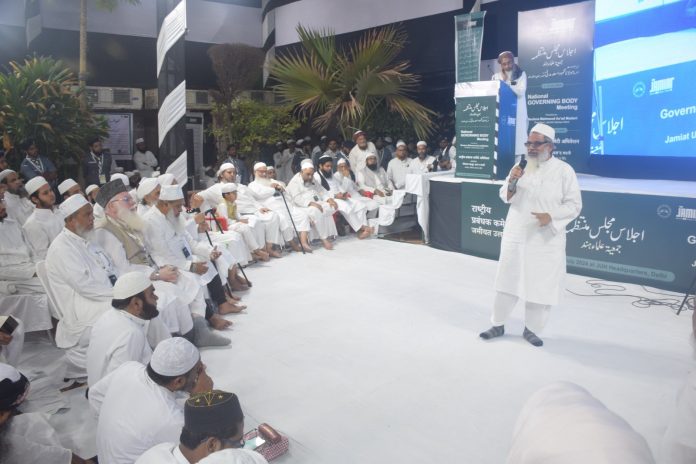By Abdul Bari Masoud
New Delhi, July 6: Jamiat Ulama-i-Hind (M) president Maulana Mahmood Asad Madani on Friday strongly condemned the Uttar Pradesh government’s directive to transfer students from unregistered madrasas to mainstream schools. He also criticized the Indian government’s role in the ongoing Israeli aggression in occupied Gaza and the West Bank.
Addressing Jamiat’s Governing Council meeting on its second day, Maulana Madani asserted that madrasas are constitutionally exempt from mainstream educational laws, particularly the Right to Education Act, 2009. Recently, the Uttar Pradesh Chief Secretary instructed all district magistrates to transfer children from 4,204 unregistered madrasas to mainstream educational institutions.
Maulana Madani reiterated that madrasas are exempt from government educational regulations, a right guaranteed by the constitution, which Muslims are unwilling to relinquish.
He also emphasized the need for Ulama to acknowledge and adapt to contemporary challenges. Without understanding modern issues, he cautioned, Ulama would struggle to protect young minds from straying. He urged Ulama to strengthen and empower themselves.
Maulana Madani also criticized India’s recent arms supply to Israel amidst the ongoing conflict in Palestine, invoking Gandhi’s legacy of advocating for Palestinian rights. He characterized the arms supply as a betrayal of India’s values and a grave injustice.
The JUH Governing Council also passed a resolution on ‘Necessary Measures for Protection and Safeguard of Islamic Madrasas.’ It demanded that the government and other authorities immediately stop slanderous campaigns against madrasas.
To tackle present challenges, the meeting urged madrasas to focus on internal reform and ensure the implementation of suggestions made by the ‘Standing Committee for the Protection of Madrasas.’
In another resolution, the JUH Governing Council vehemently denounced attempts by the Union and state governments to impose religiously antagonistic practices on pupils, saffronize the educational system, and enforce a uniform civil code. It also backed the Muslim quota, debunking the false claim that it is based on religion.
“Every citizen of this country is free to uphold their religious practices and beliefs under the constitution. Therefore, it is an infringement on religious freedom and a violation of the constitution when the government imposes mandatory directives on schoolchildren to conduct Surya Namaskar, Saraswati Puja, Hindu songs, ashlokas, or wear tilak. Muslims and any reasonable Indian would find such mandates unacceptable,” the resolution reads.
It urged the government to desist from such actions and encouraged Muslims to instill a strong belief in Tawheed in their children, ensuring they do not engage in polytheistic practices while attending school. If forced, they should protest and use all available legal defenses to safeguard their rights.
On the uniform civil code, the Jamiat said it is part of a larger plot to restrict people’s freedom of religion and fundamental rights. Many social groups, including Muslims, find this action unacceptable. The resolution urged the Union Government and its coalition partners to carefully study the Law Commission of India’s recommendations based on public feedback before moving forward with any proposal for a uniform civil code.
On the issue of Muslim reservations, the resolution clarified that Article 16(4) of the Constitution mandates reservations for underrepresented and marginalized groups. Within the framework of the Indian Constitution, special reservations for Muslims have been introduced in several states through proactive affirmative measures meant to lessen social and economic inequities. The resolution called on other state governments to follow suit. It also reiterated the demand to remove the religious bar from Article 341, which prohibits Muslims and Christians from benefiting under SC reservation.
Regarding Waqf Properties, the meeting denounced the alleged dishonesty and plots against Waqf Properties by communal forces. It asserted that Muslims donated Waqf holdings to help the underprivileged and meet religious and societal needs. It warned that any attempt to repeal the Waqf Act would be seen as a plot to jeopardize the rights of the Muslim minority and the country’s well-being.
In a resolution on the Assam Land Policy, the Jamiat declared it unconstitutional to force members of linguistic and religious minorities to evacuate their land under the 2019 Assam Land Policy. It called on the Union and state governments to protect the equality of the Assamese people, remove this clause, and ensure minorities, particularly Muslims, are not denied the land they have been entitled to for more than a century.




